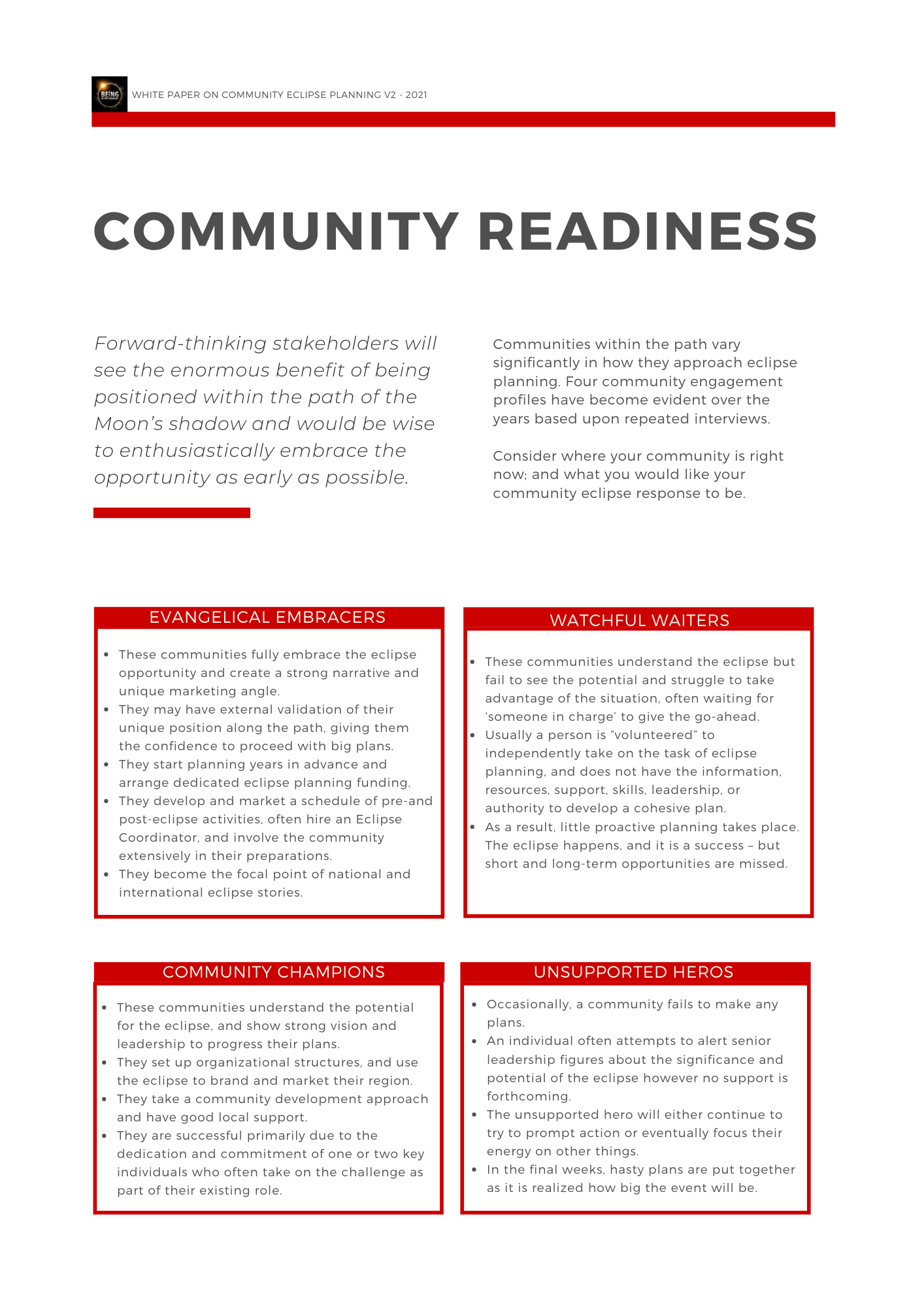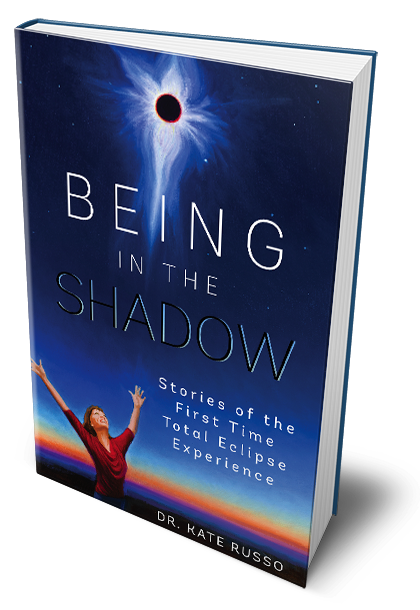GETTING STARTED – TOP QUESTIONS
Here are the most common questions I receive in Q&A format. Over time I will add to these, so check back regularly for any updates.
You can also request a one-hour consultation session so I can provide tailored solutions for your unique circumstances.
DO I REALLY NEED TO PLAN ANYTHING IF THE ECLIPSE IS GOING TO HAPPEN ANYWAY?
.
The eclipse will happen regardless, so it is true that technically you can do nothing and spend nothing and ‘host’ the eclipse.
However, you will need to plan for the IMPACT of the eclipse. That is, the people who will be coming, needing places to stay, and needing resources. You will need to know about this and be prepared. Being in the path of totality will guarantee a spotlight – but do you wish your community to be associated for being poorly prepared and a disaster?
You will also need to plan if you want to make the most of this unique opportunity, and to ensure any long-term benefits. In my experience, EVERY community benefits from promotion. Use your time in the spotlight to highlight the things you wish to highlight.
There is no ‘one way’ to plan for a total solar eclipse in a community–each community is unique and has their own identity.
Having no plan is not really an option. Taking a paint-by-numbers approach is ok, but your community will be left in the dark. To really benefit, develop a unique community eclipse planning strategy so you can shine!
A total solar eclipse is unlike any other major event. No one offers to ‘host’ the eclipse–the universe chooses you. And when you are in the path of totality, you are likely to have to coordinate the largest crowds you are likely to experience. People remember the experience for a lifetime.
Find your uniqueness. Know your strengths and assets and build upon them. Amplify what your community is most known for. The eclipse will come and go, but these are the things you will then continue to be associated with.
I often compare the eclipse to hosting the Olympics. That is a massive task, but with planning in advance and investment in the communities, there can be a long-lasting legacy.
One of my biggest frustrations is seeing large amounts of money chaotically thrown around at the last moment to ‘leverage the event’. Usually, this is because those in charge approached the eclipse as a single high-risk event, and only saw the opportunities at the last moment. You can avoid this by starting early. Used wisely, even small pots of money can have a great impact and long-term benefit.
It really is simple. Don’t approach eclipse planning as a single event to be managed. Instead, align your eclipse planning with your community and tourism development strategy. See my free White Paper for guidance.
WHO TAKES THE LEAD? WHO'S IN CHARGE?
.
Every community will need to tailor a plan to suit their unique location and identity to find their own way.
Having been involved in many large and small communities across many states and countries, I noticed some patterns (see table).
Generally speaking, eclipse planning falls within the two major management styles – top-down and ground-up. Sometimes there is a combination of both, but for clarity, here is an overview:
A ground-up approach allows those on the ground to make decisions and deliver actions. This approach ensures ownership, pride, and cohesion. Decision-making can be responsive and quick, with much creativity and a celebratory feel. Visitors feel the community in action.
For this to be successful, someone with passion needs to be the main driver to keep forward momentum over time. Recognition of the significant time burden is essential. A clear eclipse planning strategy is required, with guidance on state-wide impacts requiring coordinated efforts with others.
The biggest challenge is people recognizing they CAN be in charge of what happens in their community. The ground-up approach is most likely to ensure long-term gains for the community.
The top-down approach is when the eclipse strategy and key decisions are devised by those at the top of a hierarchy, with delivery implemented by those on the ground. Governance structures are already established, allowing working groups to coordinate efforts. Usually, the strategy follows a ‘major event’ management approach to ensure accountability and coordination of key services.
For this to be successful, planning must start years in advance, with regular communication and involvement with those on the ground.
There is a danger of the eclipse strategy becoming consumed by risk and safety, becoming too ‘top-heavy,’ and having a narrow event management view. This can result in many lost opportunities. Those on the ground in the community can feel frustrated and disillusioned to see inefficient use of limited resources with no long-term community benefits. Visitors notice issues – the delayed decision-making often leads to conflicting information and price-gouging, which leads to long-term reputational risk.
If your community has a passionate and engaged person willing to lead the way from the ground up, I believe this is the best way to ensure a great eclipse celebration and long-term benefits. I love supporting and visiting these communities, and they often make the best places to experience your first total solar eclipse.
Don’t wait for ‘permission’ – just go for it!

HOW MANY PEOPLE WILL COME TO MY TOWN?
.
The short answer is… that is the wrong question.
To get a handle on this, we need to look at two elements:
A. What is the appeal of my town’s location within the path of totality?
This is a much more important question; perhaps you may need guidance from someone who understands the path of totality.
Some locations within the path will be the primary areas of appeal. It is essential to know if your town is one of these.
Eclipse chasers will always try to be guided by weather, and as close to the centreline as possible. Those coming at the last minute will use proximity to the path. Others who do now have this knowledge will select locations of appeal and personal interest, and possibly based on how the region is advertising.
Therefore, you will need to interpret your location according to these factors. Only then will you understand the appeal of your region.
Then comes the second part of the response.
B. What is your capacity?
In reality, no one knows how many people will enter the path on eclipse day. We can use models and population estimates to get a sense and to establish the need to plan. But this will always be one of the unknowns.
But what IS known – is your capacity.
We can get reasonably accurate figures by looking at the existing capacity of your accommodation, transport, food, waste, communications etc. Use your annual feature event as a guide, and then scale up.
Only your town can decide how far you should increase capacity. Do you wish to keep it small and intimate? Then let it be known when you have reached your capacity so folk can choose to go elsewhere.
Do you want to go large? First, consult with Emergency Management and Transport departments to determine what is possible, as state-wide coordination is essential. Then fully explore options to increase capacity and plan accordingly.
I strongly recommend only using capacity when communicating about your numbers. Avoid putting any random scary figures out there.
WHAT IS THE MOST COMMON ISSUE RAISED BY THOSE INVOLVED IN ECLIPSE PLANNING?
.
Poor communication is the main issue that prompts folk to reach out for guidance. When communication improves, stakeholder engagement increases and magic happens.
Small communities are especially vulnerable to lack of information or involvement in eclipse planning efforts happening at a higher level, yet can be the most impacted.
When eclipse planning, you cannot work in a silo – you must be actively communicating and listening across networks, and with layers above and below. Often new working partnerships need to be formed. Sometimes communication is great across one layer, but not effective across departments or regions.
Those on the ground are best placed to identify problems and offer solutions, knowing how to strengthen existing local assets. They often do not know who to talk with, or how, and are often not aware of what is being planned at regional, state or national level.
If you are eclipse planning at a higher level, then make sure to reach out to every community within the path to ensure they have a voice, are listened to, and can offer solutions to the issues you are needing to resolve.
If your only communication strategy is through ‘information sessions’, you need to explore how to encourage dialogue and real involvement.
HOW DO I SCHEDULE MY ECLIPSE VIEWING EVENT?
.
DOWNLOAD ECLIPSE PLANNING RESOURCES
Complete the form to let me know you exist so I can support you in your efforts.

